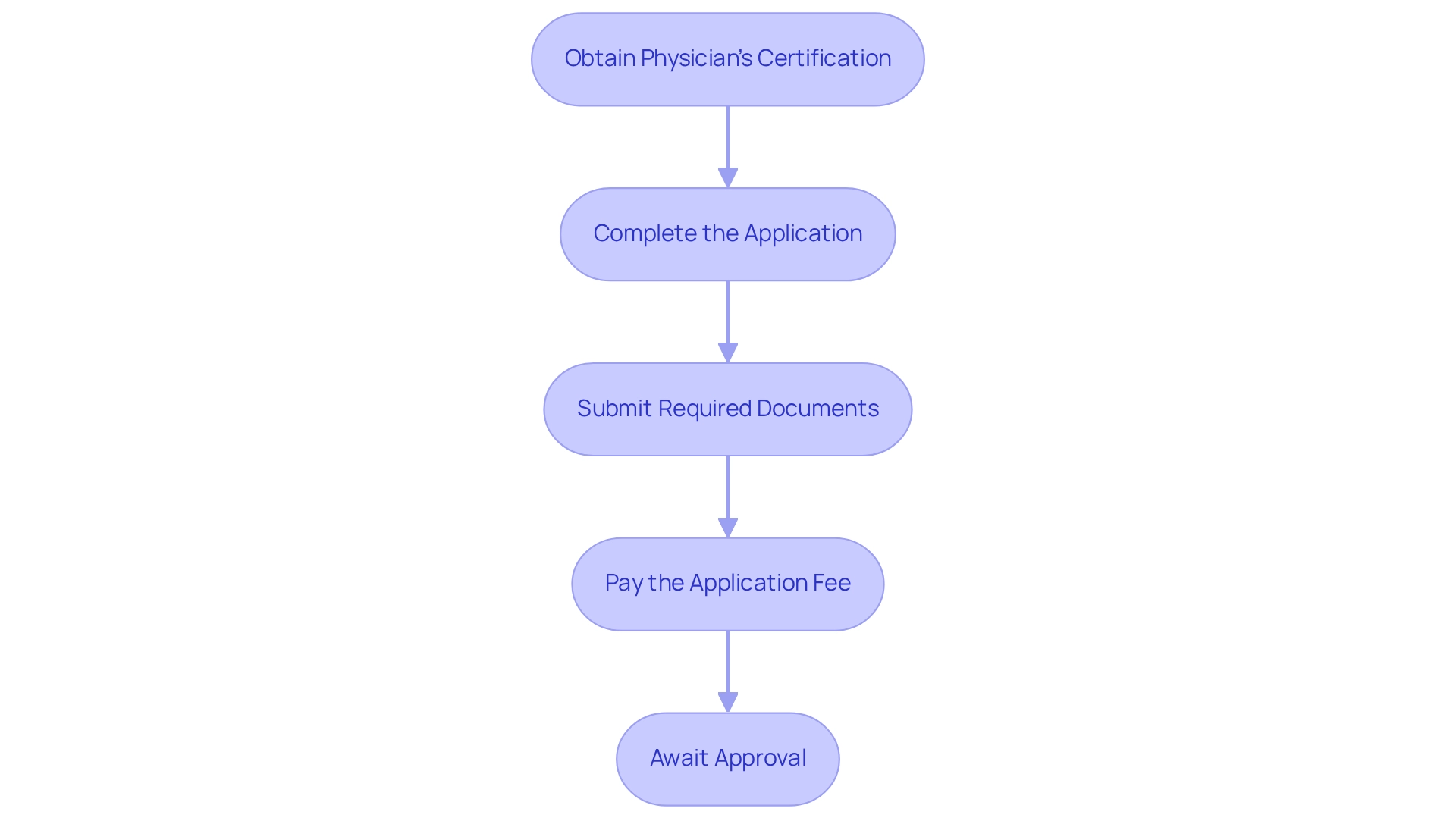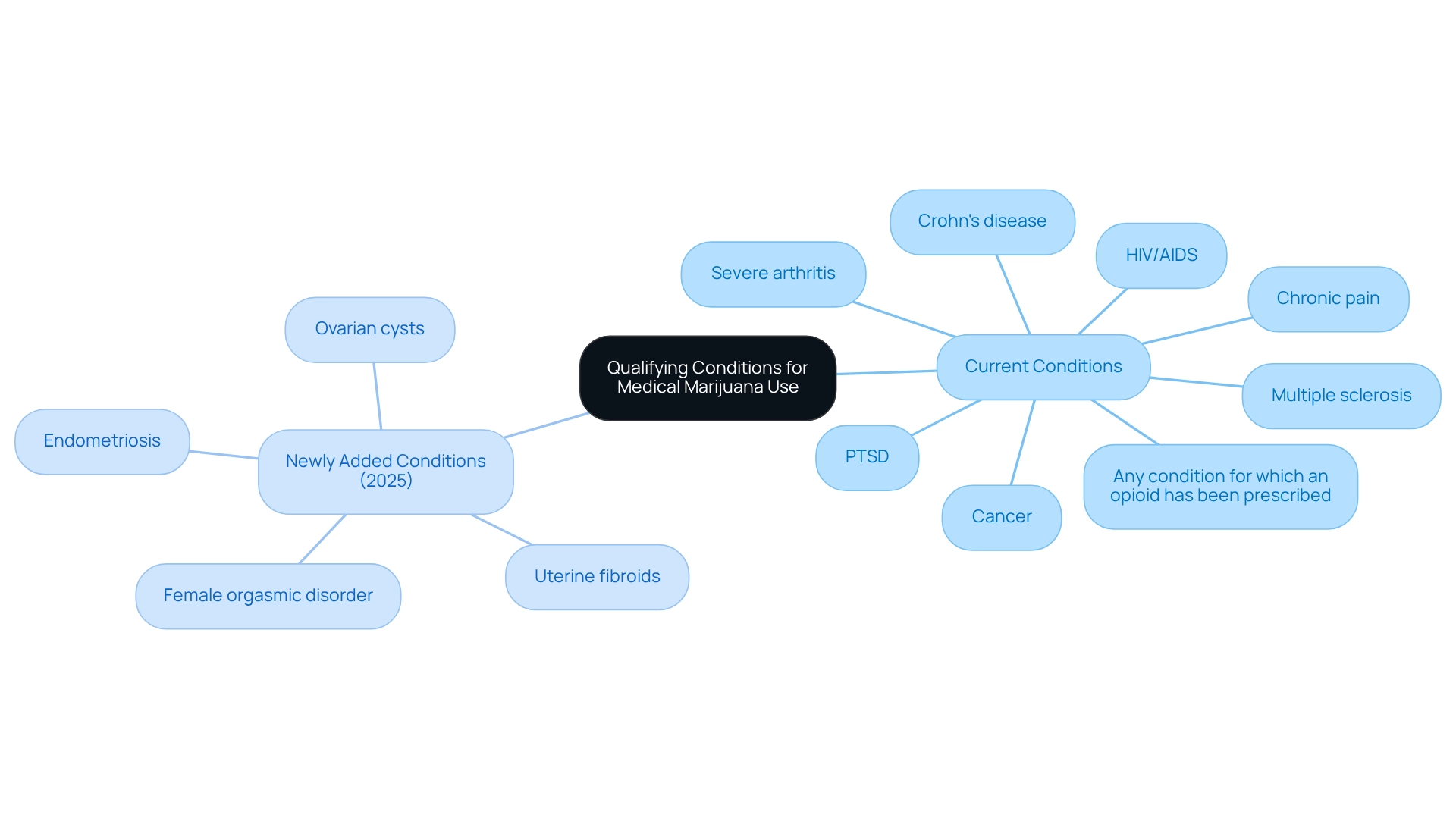Navigate Medical Marijuana Illinois: Steps to Access Care
by Maya Green · April 22, 2025
Discover how to navigate medical marijuana access in Illinois with essential steps and resources.

Overview
If you’re considering accessing medical marijuana in Illinois, it’s important to know that the process can feel overwhelming. You’ll need to obtain a physician’s certification, complete an application, and submit required documents to the Illinois Department of Public Health. Understanding these steps can be challenging, but there are resources available to help you.
Services like Leafy DOC are here to support you through this journey. They offer telehealth consultations, which can make it much easier for you to navigate the requirements. You may find that having a compassionate professional by your side can alleviate some of the stress associated with gaining access to therapeutic cannabis for your qualifying health conditions.
Remember, you’re not alone in this process. Many individuals share similar experiences and concerns, and it’s okay to seek help. Take the first step today by reaching out for guidance, and know that assistance is available to help you through each stage of this journey.
Introduction
In recent years, the landscape of medical marijuana in Illinois has transformed significantly, driven by evolving legislation and increasing patient acceptance. The Compassionate Use of Medical Cannabis Program Act has paved the way for thousands of individuals seeking relief from debilitating conditions through therapeutic cannabis use. With over 40,000 registered patients, the demand for accessible healthcare solutions has never been greater.
As you navigate the complexities of obtaining a medical marijuana card, it’s important to remember that help is available. Telehealth services, such as those provided by Leafy DOC, emerge as a beacon of hope, simplifying the application process and ensuring that even those in underserved areas can connect with qualified healthcare professionals. This article delves into the legal framework, application procedures, qualifying conditions, and the benefits of telehealth services. By providing a comprehensive guide, we aim to support you in considering medical cannabis as a viable treatment option, empowering you to take the next step toward relief.
Explore the Legal Landscape of Medical Marijuana in Illinois
In Illinois, the legal framework for medical marijuana is primarily established by the Compassionate Use of Medical Cannabis Program Act. This important law allows individuals facing qualifying health challenges to obtain medical marijuana in Illinois for therapeutic purposes, provided they are at least 18 years old and residents of the state.
The Illinois Department of Public Health (IDPH) oversees the Medical Cannabis User Registry Program, which requires individuals to apply for a medical marijuana therapeutic cannabis card. Leafy DOC plays a vital role in this process, simplifying the application and consultation steps through its secure telehealth services. By providing your personal information and an identification document on the intake form, you can effortlessly arrange an on-demand telehealth session or select a more convenient time for a future appointment. This ensures you can navigate the IDPH requirements efficiently from the comfort of your home.
As of 2025, the registry statistics reflect a growing acceptance of medical marijuana in Illinois, with over 40,000 individuals currently registered. Notably, Rock Island County reported 957 active cannabis users in 2021, while Cook County experienced a substantial increase in user numbers, rising from 17,000 in 2019 to almost 31,000 in 2021. This information highlights the varying availability and demand for medical marijuana in Illinois, underscoring the need for ongoing advocacy and support for those seeking medical marijuana.
Leafy DOC addresses these disparities by providing accessible telehealth services, allowing individuals in underserved regions to connect with trusted, board-certified healthcare professionals for personalized assessments related to medical marijuana. Understanding the legal stipulations, including possession limits and rights, is essential for anyone considering therapeutic marijuana as a treatment option.
The benefits of possessing a medicinal herb card include:
- Legal protections under state regulations for the acquisition, ownership, and use of therapeutic plants.
- Access to a variety of high-quality, lab-tested products.
- The ability to utilize the herb under the guidance of healthcare experts.
The evolving landscape of cannabis regulations in Illinois, particularly regarding medical marijuana and updates to the Compassionate Use of Cannabis Program Act, reflects a commitment to improving patient access and care. Additionally, it is important to consider the context of marijuana-related arrests in Illinois, as this influences the overall legal environment surrounding the use of the substance. For further details, please consult the Illinois Department of Public Health.
Navigate the Application Process for Medical Marijuana Cards
Applying for a medical marijuana card in Illinois can feel overwhelming, but by following these essential steps, you can navigate the process with confidence and care:
- Obtain a Physician’s Certification: Start by arranging a meeting with a licensed doctor who specializes in cannabis evaluations through Leafy DOC. Booking your appointment online is simple and allows you to connect with the right doctor from the comfort of your home. During this consultation, the physician will assess your condition and determine if you qualify for a certification. It’s important to remember that the certification for medical marijuana in Illinois must be submitted to the IDPH along with the application.
- Complete the Application: Access the Illinois Cannabis Tracking System to fill out the medical marijuana Illinois application form. Ensure that all information is accurate and complete to avoid any unnecessary delays; your attention to detail is vital.
- Submit Required Documents: Along with your application for medical marijuana in Illinois, include proof of residency, a copy of your physician’s certification, and any additional documentation required by the Illinois Department of Public Health (IDPH) related to medical marijuana Illinois. Gathering these documents may seem daunting, but taking it step by step can make it manageable.
- Pay the Application Fee: The charge for the cannabis card varies depending on its length: $50 for one year, $100 for two years, and $125 for three years. It’s helpful to plan for this expense as you move forward.
- Await Approval: The IDPH typically processes applications within 30 days. You may find it comforting to know that you can conveniently check your application status online during this time.
By diligently following these steps and seeking guidance from qualified healthcare experts regarding your conditions, you can effectively navigate the application process for medical marijuana in Illinois and enhance your chances of a successful outcome. Get your medical card today and connect with licensed physicians online in minutes!
Identify Qualifying Conditions for Medical Marijuana Use
In Illinois, a variety of conditions qualify for medical marijuana use, demonstrating the state’s commitment to providing relief for patients with debilitating ailments through medical marijuana Illinois. The current list includes:
- Cancer
- HIV/AIDS
- Crohn’s disease
- Multiple sclerosis
- Chronic pain
- PTSD
- Severe arthritis
- Any condition for which an opioid has been prescribed
As of 2025, newly added conditions include endometriosis, ovarian cysts, uterine fibroids, and female orgasmic disorder. It’s important to acknowledge that chronic discomfort, a common concern for many, is recognized as a qualifying condition. This highlights the significance of therapeutic marijuana in managing pain effectively.
Statistics reveal that chronic pain affects a substantial segment of the population. Leafy DOC supports a community of over 40,000 patients who have sought relief through cannabis. Expert opinions emphasize the therapeutic potential of medical marijuana in Illinois for chronic pain management, with healthcare professionals advocating for its use in suitable cases. Dr. Sameer Vohra, the Director of IDPH, expressed, ‘IDPH is eager to work alongside our healthcare providers to guarantee suitable access for those facing these recently approved conditions.’
Real-world examples illustrate the beneficial effects of therapeutic marijuana on individuals experiencing chronic pain. Many who have transitioned from opioid prescriptions to cannabis report an enhanced quality of life and fewer side effects. As an example, Ryan K. remarked, ‘I had experimented with various methods for pain relief previously, and this service transformed my life.’ The physician grasped my requirements and assisted me in making a well-informed choice. Forever grateful!
Furthermore, a recent case study emphasized how veterans utilizing therapeutic marijuana experienced fewer PTSD symptoms and required fewer prescription medications. This illustrates the broader advantages of this type of therapy.
For a complete list of qualifying conditions, you are encouraged to consult with Leafy DOC or your healthcare provider to determine your eligibility. This ensures that you obtain the most precise and tailored advice concerning your therapeutic options, making the process swift, accessible, and compassionate.
Utilize Telehealth Services for Efficient Access to Medical Cannabis
Telehealth services offer a convenient and efficient way for patients to consult with licensed health professionals without the need for in-person visits. If you’re considering accessing therapeutic marijuana through Leafy DOC, here’s how you can effectively utilize telehealth:
- Find a Telehealth Provider: At Leafy DOC, our compassionate team of licensed marijuana doctors is here to guide you through the process. You can easily connect with certified healthcare providers who specialize in cannabis evaluations.
- Schedule an Appointment: Our user-friendly online platform allows you to book a consultation at a time that works for you. This flexibility is especially beneficial for those facing mobility challenges or who may be homebound, enabling you to receive care from the comfort of your home.
- Prepare for Your Consultation: It’s helpful to gather your health history and any relevant documents to discuss with your provider. Being prepared can lead to a more productive consultation, ensuring that your unique needs are addressed.
- Obtain Your Certification: If approved, your doctor will provide a certification for you to apply for your marijuana card. Many individuals at Leafy DOC receive their certifications within 24-48 hours, allowing for a swift transition to accessing cannabis.
- Follow Up: Keep in touch with your provider for ongoing support and any necessary follow-up evaluations. Leafy DOC is dedicated to assisting you through the application and renewal stages, ensuring you have continued access to the care you need.
Telehealth not only saves time but also enhances accessibility, allowing individuals to receive care from the comfort of their homes. Leafy DOC’s telehealth services simplify the process of obtaining a medical marijuana Illinois card, making it easier for patients, particularly those with mobility challenges, to access the treatment they need. As telemedicine continues to be an essential part of healthcare, it remains a vital option for those seeking medical marijuana in Illinois.
Conclusion
The transformation of medical marijuana access in Illinois represents a significant shift towards patient-centered care, driven by evolving legislation and increased acceptance. The Compassionate Use of Medical Cannabis Program Act has created a legal framework that empowers over 40,000 registered patients to pursue therapeutic cannabis as a viable treatment option. With the help of telehealth services like Leafy DOC, patients can easily navigate the application process, ensuring that even those in underserved areas have access to qualified healthcare professionals for personalized evaluations.
Understanding the qualifying conditions for medical cannabis is essential for patients seeking relief from debilitating ailments. The inclusion of chronic pain, PTSD, and newly recognized conditions underscores the therapeutic potential of cannabis in managing various health issues. Real-life testimonials further illustrate the positive impact of medical marijuana, showcasing improved quality of life for many patients who have transitioned from conventional treatments.
Ultimately, the integration of telehealth into the medical cannabis landscape not only streamlines access but also enhances the overall patient experience. As Illinois continues to refine its approach to medical cannabis, it is important for patients to remain informed about their rights, the application process, and the benefits of telehealth services. Embracing these resources can empower individuals to take control of their health journey and explore the potential relief that medical marijuana offers.
Frequently Asked Questions
What is the legal framework for medical marijuana in Illinois?
The legal framework for medical marijuana in Illinois is established by the Compassionate Use of Medical Cannabis Program Act, which allows individuals with qualifying health challenges to obtain medical marijuana for therapeutic purposes.
Who is eligible to apply for a medical marijuana therapeutic cannabis card in Illinois?
Individuals must be at least 18 years old and residents of Illinois to be eligible to apply for a medical marijuana therapeutic cannabis card.
How does the application process for a medical marijuana card work?
The Illinois Department of Public Health (IDPH) oversees the Medical Cannabis User Registry Program, requiring individuals to apply for a medical marijuana therapeutic cannabis card. Leafy DOC simplifies this process through secure telehealth services, allowing users to provide personal information and identification to arrange telehealth sessions.
How many individuals are currently registered for medical marijuana in Illinois?
As of 2025, over 40,000 individuals are registered for medical marijuana in Illinois.
What are the statistics regarding cannabis users in Rock Island and Cook Counties?
In 2021, Rock Island County reported 957 active cannabis users, while Cook County saw an increase in users from 17,000 in 2019 to almost 31,000 in 2021.
How does Leafy DOC support individuals in underserved regions?
Leafy DOC provides accessible telehealth services, allowing individuals in underserved areas to connect with trusted, board-certified healthcare professionals for personalized assessments related to medical marijuana.
What are the benefits of possessing a medicinal herb card in Illinois?
The benefits include legal protections under state regulations for the acquisition and use of therapeutic plants, access to high-quality, lab-tested products, and guidance from healthcare experts when utilizing the herb.
Why is it important to understand the legal stipulations regarding medical marijuana?
Understanding the legal stipulations, including possession limits and rights, is essential for anyone considering therapeutic marijuana as a treatment option to ensure compliance with state laws.
Where can I find more information about medical marijuana regulations in Illinois?
For further details, you can consult the Illinois Department of Public Health.
Last Updated: July 4, 2025
Get Approved for Your Medical Marijuana Card in Minutes!

Get Your Medical Card
Connect with a licensed physician online in minutes

Like This Article?
Share with your friends
Table of Contents
Keep Reading
-
4 Steps for Medical Marijuana Renewal PA Made Easy
Simplify your medical marijuana renewal in PA with essential steps and guidelines.
-
Understanding Louisiana Medical Marijuana Card Costs for Patients
Discover the factors influencing Louisiana medical marijuanas card cost and how to navigate them.
-
5 Popular Hybrid Medical Cannabis Strains
Discover the top 5 hybrid medical cannabis strains that are revolutionizing the industry. Find out what makes these hybrids so special and choose your perfect match today! Learn more about hybrid weed now.





